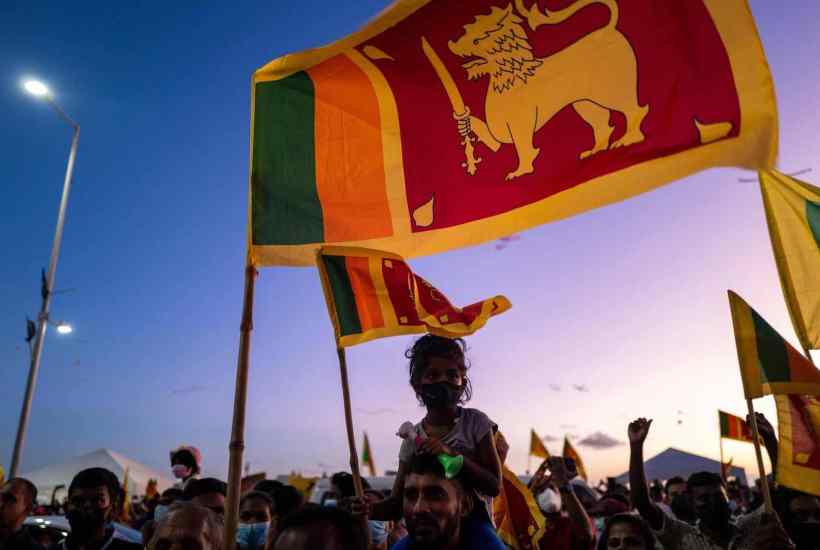Colombo, Sri Lanka
Some 13 years after the end of a civil war that saw 100,000 deaths, Sri Lanka is once again on the cusp of serious violence. Earlier today, the police opened fire on protesters in the town of Rambukkana. One person has died and at least ten people are said to be in critical condition. It’s the first use of deadly force against demonstrators who seem to have filled the entire island in recent weeks. Grainy footage shows half-conscious bodies being carried into hospital, bullet casings littering the quiet palm-lined streets.
This was meant to be a time of celebration. Buddhists are marking the new year while the country’s Muslim minority observe Ramadan. Instead, the country has been brought to a standstill by nationwide protests demanding that President Gotabaya Rajapaksa resign amid a crippling economic crisis.
Sri Lanka’s capital, Colombo, is now a ghost town. The savings of the country’s burgeoning middle classes have become worthless: the Sri Lankan Rupee is now the world’s worst-performing currency. India’s southern neighbour owes international lenders more than £21 billion, with just £1.7 billion in reserves. Shops and restaurants are closed and armed police patrol the streets. The price of vegetables has increased fivefold since 2021, while the cost of rice has doubled. Many residents say they are unable to eat more than one meal a day.
Rajapaksa, a Sinhalese Buddhist, was elected President in 2019 following the Easter Sunday terror attacks. To many Sri Lankans – particularly the country’s Sinhalese Buddhist majority, around 70 per cent of the population – he seemed the obvious choice to restore law and order, having served as defence secretary during the civil war. He is credited with bringing an end to the 26-year conflict, but not without allegedly committing an array of gross human rights abuses against Sri Lanka’s Tamil minority. It’s difficult to find a more polarising figure in South Asian politics.
Since his election, Rajapaksa has faced accusations of economic mismanagement, embezzlement and corruption. His brother, Mahinda, is the country’s Prime Minister and another brother, Basil, was finance minister until he resigned last week along with the rest of the cabinet. Basil implemented a series of ill-advised tax cuts back in 2019; Sri Lanka was subsequently locked out of international debt markets and has had to burn through its foreign exchange reserves to service sovereign bond payments.
The Rajapaksas were also behind a sudden decision to suddenly ban chemical fertilisers last May, without consulting farmers, which led to a disastrous drop in rice yields this year. They claimed that it would protect farmers from harmful chemicals which were causing kidney issues. Unable to afford food imports, Sri Lanka saw yields of domestically-grown rice fall by around 50 per cent.
In order to deal with the surging levels of debt, Sri Lanka announced a blanket ban on non-essential imports last year. Now, everything from milk powder to spare car parts are unavailable. Even school exams have been cancelled because the government can’t afford the paper on which to print the tests.
Fuel, gas and diesel shortages have become common. Sunrise in Colombo is met by crowds of residents heading to petrol stations and waiting, usually in vain, to fill up their vehicles. In an attempt to preserve supplies, the government is enforcing ten-hour daily power cuts across the country.
Unsurprisingly, Sri Lankans are angry. Last Saturday, in the largest protest to date, tens of thousands of Colombo residents took to the streets demanding regime change. Many also called for the Rajapaksa brothers to have their day in court. ‘It was never this bad during the civil war,’ one 43-year-old IT worker in Colombo explains. ‘At least then we had food to eat, power in our homes and fuel in our cars.’
It seems growing numbers of Sri Lankans agree. The weekend before last, Muslim leaders marched side-by-side with saffron-robed Buddhist monks before members of the country’s LGBTQ community joined them to break the Ramadan fast. You find groups of wealthy professionals chanting anti-Rajapaksa slogans alongside poor rickshaw drivers who can no longer afford fuel. Doctors and nurses are becoming a vocal part of the protests.
Meanwhile, Sri Lanka’s largest public medical body, the Government Medical Officers Association, has declared a health emergency. Hospitals have run out of five life-saving drugs and the GMOA says there are shortages of another 180 medicines, as well as a lack of vital surgical and testing equipment. There are reports of several deaths due to a shortage of Tenecteplase, a drug administered to patients after heart attacks. Pharmacies surrounding Colombo’s leading cancer hospital are turning away patients. The GMOA is pleading with Sri Lankan expats to send essential drugs.
Yet the Rajapaksas remain resolute: Gotabaya has refused to resign. The country’s new finance minister, who attempted to quit less than 24 hours in the job, has said that reviving the economy will be a ‘Herculean’ task. He estimates Sri Lanka requires £2.3 billion in aid over the next six months to purchase essentials like food and fuel, in addition to meeting £5.3 billion of debt repayments for the rest of the year.
Many Sri Lankans blame high-interest Chinese loans for the crisis. Already, Sri Lanka has been forced to lease a new mega port to China in lieu of repayments. Spotting an opportunity, India has signed over £760 million of credit to Sri Lanka and talks are underway for a further £1.1 billion of financial support.
Back in Colombo, some are saying this is Sri Lanka’s ‘Arab Spring’ moment, as peaceful protesters seek to overthrow an autocratic government mired in corruption allegations and complicit in gross economic mismanagement. But for now, Sri Lanka’s notorious military continues to support the Rajapaksas. Whether that continues is an open question.
‘We haven’t seen anything like this for decades, there is no gas, no fuel, no food. The whole country is coming out onto the streets,’ one 22-year-old protester says. ‘The Rajapaksas have to go right now or it is going to be the end of us all.’
Got something to add? Join the discussion and comment below.
Get 10 issues for just $10
Subscribe to The Spectator Australia today for the next 10 magazine issues, plus full online access, for just $10.




















Comments
Don't miss out
Join the conversation with other Spectator Australia readers. Subscribe to leave a comment.
SUBSCRIBEAlready a subscriber? Log in